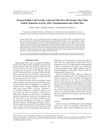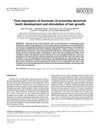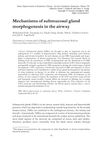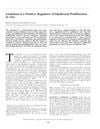 15 citations,
September 2008 in “Archives of Dermatological Research”
15 citations,
September 2008 in “Archives of Dermatological Research” Roxithromycin, an antibiotic, can increase hair growth and might be used as a treatment for hair loss.
 54 citations,
April 2019 in “Journal of cellular physiology”
54 citations,
April 2019 in “Journal of cellular physiology” miR-218-5p helps skin and hair growth by targeting SFRP2 and activating a specific signaling pathway.
22 citations,
July 2016 in “Cellular and Molecular Life Sciences” Genetic changes in mice help understand skin and hair disorders, aiding treatment development for acne and hair loss.
 22 citations,
October 2012 in “Cell Transplantation”
22 citations,
October 2012 in “Cell Transplantation” Cells treated with Wnt-10b can grow hair after being transplanted into mice.
 11 citations,
January 2018 in “Royal Society Open Science”
11 citations,
January 2018 in “Royal Society Open Science” Scientists found genes linked to the growth of high-quality brush hair in Chinese Haimen goats.
 34 citations,
December 2009 in “The International Journal of Developmental Biology”
34 citations,
December 2009 in “The International Journal of Developmental Biology” Too much thymosin beta4 causes weird teeth and more hair growth in mice.
 9 citations,
December 2002 in “Novartis Foundation Symposium”
9 citations,
December 2002 in “Novartis Foundation Symposium” LEF1 is essential for the development of airway glands and is regulated by the Wnt/ß-catenin pathway.
October 2023 in “Nutrients” Millet and wheat extracts may improve hair health and promote growth.
 28 citations,
October 2011 in “International Journal of Molecular Medicine”
28 citations,
October 2011 in “International Journal of Molecular Medicine” Adenosine helps hair grow longer and stronger by boosting certain growth factors and signaling pathways.
 67 citations,
December 2008 in “Developmental Biology”
67 citations,
December 2008 in “Developmental Biology” Msx2 and Foxn1 are both crucial for hair growth and health.
 111 citations,
June 2002 in “The EMBO Journal”
111 citations,
June 2002 in “The EMBO Journal” Too much Smad7 can cause serious changes in skin tissues, including problems with hair growth, thymus shrinkage, and eye development issues.
 308 citations,
September 2010 in “Nucleic acids research”
308 citations,
September 2010 in “Nucleic acids research” Increasing mir-302 turns human hair cells into stem cells by changing gene regulation and demethylation.
 25 citations,
August 2015 in “International Journal of Cosmetic Science”
25 citations,
August 2015 in “International Journal of Cosmetic Science” Malva verticillata seed extract might help treat hair loss by activating hair growth signals in skin cells.
 11 citations,
October 2015 in “Clinical and Experimental Dermatology”
11 citations,
October 2015 in “Clinical and Experimental Dermatology” Sophora flavescens extract helps hair growth and treats hair loss.
215 citations,
November 2000 in “Journal of Investigative Dermatology” The system allows precise control of gene expression in mouse skin, useful for studying skin biology.
37 citations,
April 2018 in “Journal of Allergy and Clinical Immunology” A mutation in the IKZF1 gene causes immune system overactivity, linked to autoimmune diseases like lupus.
 28 citations,
April 1996 in “Cell biology international”
28 citations,
April 1996 in “Cell biology international” Changes in keratin affect skin health and can lead to skin disorders like blistering diseases and psoriasis.
 28 citations,
February 1999 in “Journal of Investigative Dermatology”
28 citations,
February 1999 in “Journal of Investigative Dermatology” Urokinase, a type of protein, helps skin cells multiply faster, especially in newborn mice.













